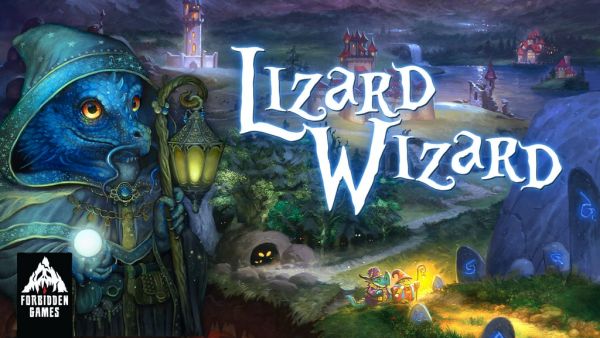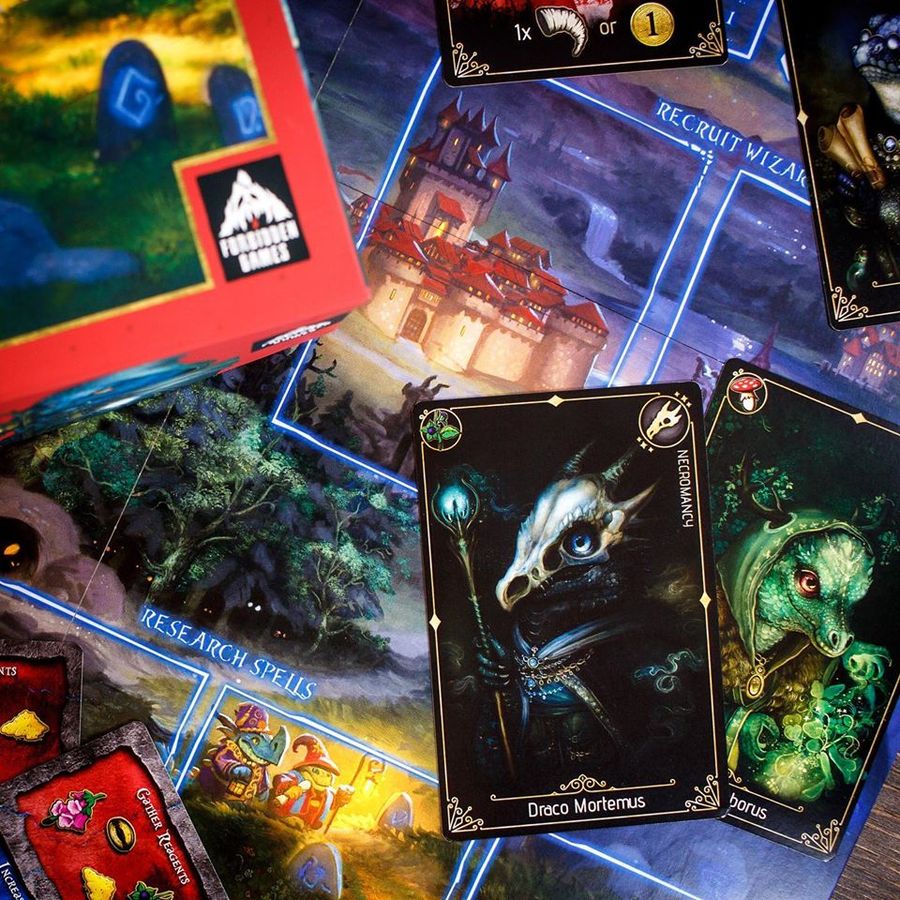Preview: Partake in Magical Market Manipulation and Mage Auctions in Lizard Wizard

Recruit wizards and familiars, cast powerful spells, delve dungeons, and build wizard towers in the magical land of Astoria!
The spiritual successor to Forbidden Games's Raccoon Tycoon, Lizard Wizard is currently on Kickstarter. With each player taking a single action each turn, turns remain fast without losing strategic depth or limiting player choice.
Gameplay
On your turn you can take one of six actions. One action you may choose is to play one of your three gather reagent cards. There are seven reagent types in the game, each associated with one of the game’s seven schools of magic. Each reagent card has two halves: the top half shows a set of reagents, and when you play the card you may take up to three of the reagents shown on the card; the bottom half determines which reagents go up in value when the card is played. The board tracks the mana value of each reagent. After playing one of these cards, you draw up to your maximum hand limit of reagent gathering cards (which is three unless modified by a spell). It is also important to remember that at the start of the game you can only hold a maximum of ten reagents at any one time. After you gather your reagents, if you have any spell cards that have not been cast, you may pay the reagents shown on one of them in order to cast it.
The second action you can take is to sell your reagents for mana. You may sell as many copies of a single reagent type as you wish; you earn mana for each reagent you sell, based on the mana value shown on the tracker on the board. You then lower its value one point for each one you sold.
Recruiting a wizard is the third action. At any time in the game, there are two wizards face-up on the board. The active player chooses which wizard is being recruited and uses mana points to place a bid on the wizard. All players take turns bidding or passing, until only one player is left in the auction. He then pays the mana he bid and places the wizard face-up in front of himself. Each wizard shows one of the seven reagents on its card. When you take the gather reagent action, you also earn the reagents shown on each of your wizards. If the active player did not win the auction, she gets to choose another action.
The fourth action choice is to research a spell. There are always four spells face-up on the table. To research a spell, you pay the mana cost shown on the card and then place the card face down in front of you to show that it was not cast. If you have the reagents shown on the card, you may immediately pay it in order to cast it. Some spells immediately go back to being uncast after you use it and you may cast them again on a future turn, some stay in effect in front of you, while others offer a one-time use and are placed in a pile to one side of you after being cast. Spells have abilities such as increasing your hand size, stealing mana from an opponent, or increasing the number of reagents you gather when playing gather cards.
Your fifth possible action is to buy a tower card. There is always one tower card face-up on the board at a time. Tower cards cost reagents and gold to purchase. As the game progresses, the tower cards slowly increase in price. Each tower shows a school of magic symbol on it, which effects scoring at the end of the game, however each tower also increases the number of reagents you can hold by one.
The final action is to summon a familiar. There are always two familiars available on the board. Familiars cost mana and, like towers, the price slowly increases as more are bought. When you purchase a familiar, you must at once decide whether to use it one of four ways. You may score it, in which case you earn two gold for each card you have (wizard, tower, spell, and other familiars) who display the school of magic icon that matches the familiar you are scoring. You may collect the reagents shown on the familiar card and cast any number of spells. You may clear the spell offer, replace them with four new spell cards, and select one for free. Or you may use the familiar to enter the dungeon.
When entering the dungeon, you draw cards from the dungeon deck one at a time. After each draw, you may choose to stop or keep going. If you choose to stop, you get to keep all the gold and items you drew (any monsters are shuffled back into the deck). If you draw two monster cards, you leave the dungeon with nothing and all the cards you drew are shuffled back into the deck.
Each game, four random achievement tiles are drawn and placed on the board (the others are returned to the box). On your turn if you meet an achievement tile's condition (such as acquiring a certain number of cards showing the same reagent or a certain amount of mana) you may claim it. This does not count as an action.
The game ends once the wizard, tower, spell, or familiar deck runs out and all players have taken an equal number of turns. Players then score ten points for a wizard and tower pair whose school of magic icons match, and five for pairs that do not match. Every spell that has been cast is worth five points if its reagent icon matches a tower and wizard pair. Any wizard or tower card not part of a pair is worth one point. You earn one point per gold, and may earn additional points for certain spells. The player with the most items from the dungeon earns ten points and the player with the second most earns five, while each achievement tile is worth ten. The player with the most points at the end of the game is the winner.

Photo provided by the publisher.
Review
Lizard Wizard blends together lots of player choice with fast turns, minimal downtime, and accessible gameplay. Limiting you to one action per turn keeps the game moving along, and the actions are all relatively simple and fast to execute, but all the parts of the game come together in a strategically satisfying blend.
Balancing the various scoring methods and options gives players many different strategies to choose from and adds depth to when you bid on wizards, which familiars to purchase, and which spells will ultimately be most valuable for you. There is also a lot of creativity in the different actions offered to you. The dungeon deck, for instance, is very different from the resource gathering and market manipulation of the gather reagent cards, while the spells have a large range of abilities that combo nicely off of different strategies. All of this feels really in line with the fantasy theme of the game and rewards different play styles.
The artwork is absolutely gorgeous, with a lovely fairy tale fantastical ambiance that is completely delightful. While the prototype we played with was not final, the final board promises to be well laid out to help keep gameplay running smoothly and track all elements.
Setting the game up can take a little bit of time, and the game can run a little long for some casual game fans. But there is a nice escalation as you acquire more spells, increase your reagent limit, and start building up combos of wizard, tower, and spell cards, and keep an eye out on the reagent icons across all your cards.
There are some spells with more ‘take that’ elements, which, tied with the wizard auctions, add more direct player interaction to the game. However, we appreciate the fact that the rulebook suggests which cards to remove if you prefer your games without ‘take that’ mechanics.
Lizard Wizard serves as a solid meeting point for fans of casual games and those looking for something a bit heftier. It makes for a fun and satisfying game night, has great pacing, and has relatively simple rules blended with intriguing strategic decisions. Check it out on Kickstarter (and admire the gorgeous artwork for yourself)!
Pros: Beautiful artwork, fast turns and minimal downtime, lots of strategic depth
Cons: Set up and game time can run long for casual game fans
Disclosure: this preview is based on our evaluation of an unpublished prototype of the game, which is subject to change prior to publication. While a modest payment was received to expedite the review process, our thoughts and opinions expressed here are honest and accurate.




